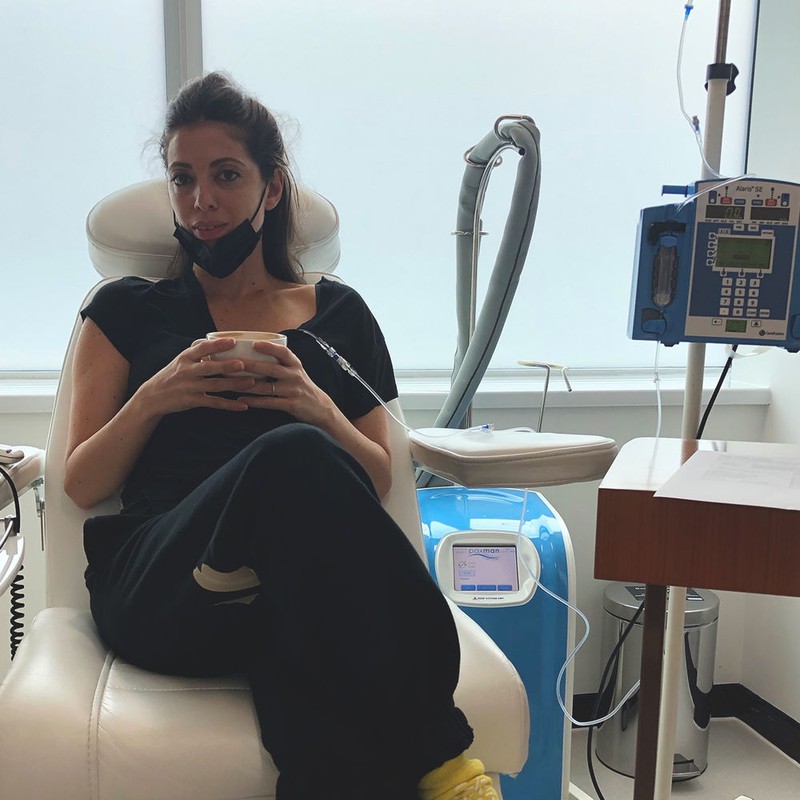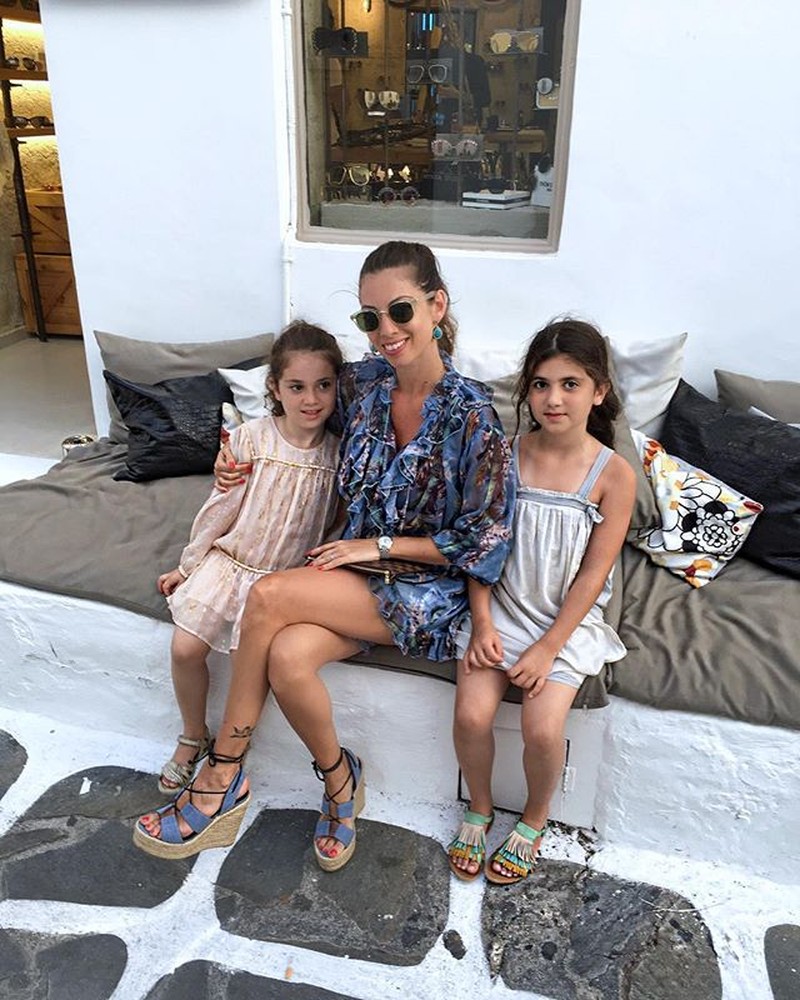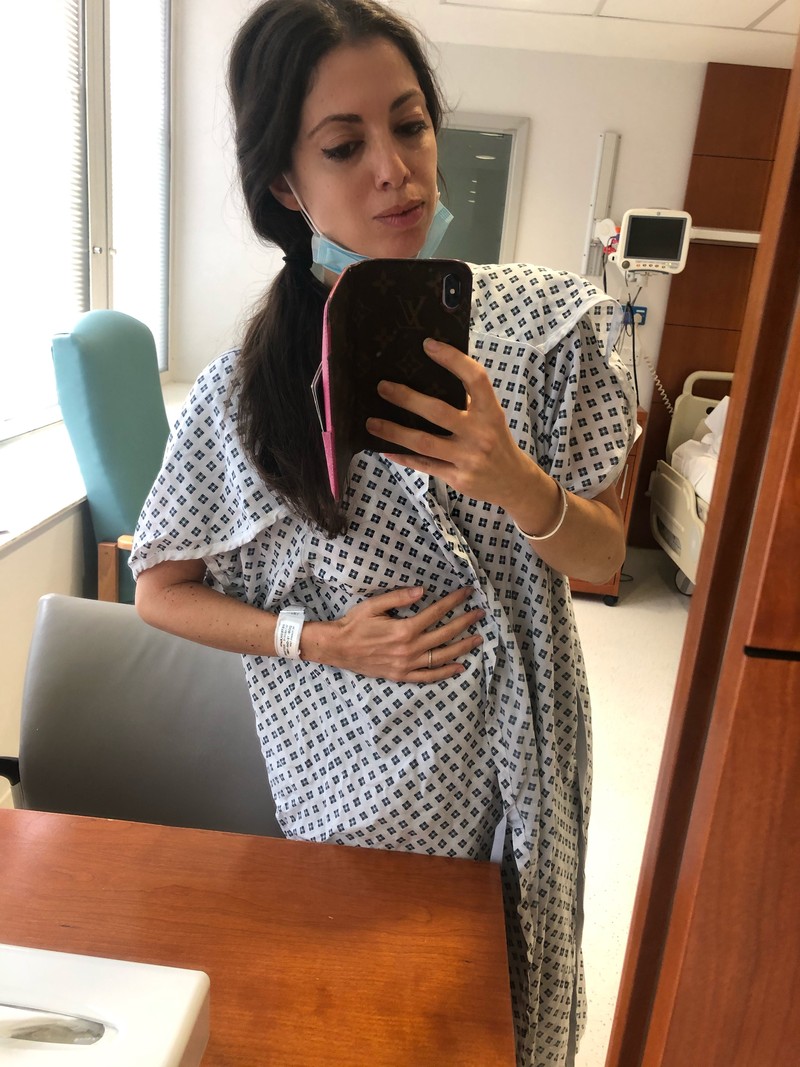My Breast Cancer Journey: Karin Greenberg
Karin – can you tell us more about your diagnosis and the journey you took to get there?
“Just after my period finished in mid-June, I noticed my right breast was inflated and dense. I’m aware it’s common for your breasts to be more tender around your period, but it was unusual for me that only one breast remained enlarged so I called my GP to get her advice. She was quick to arrange a Breast Clinic appointment for the following week, including a mammogram and ultrasound.
The doctor who examined me manually didn’t feel anything unusual, but sent me for tests regardless, and my mammogram had to be repeated as they couldn’t get sufficient images the first time. The ultrasound then highlighted some abnormalities that needed checking further with a biopsy – it was at this point that the worry kicked in. I met with the doctor after the tests and she confirmed further investigations were necessary as there appeared to be calcification in my breast. When I got home, I did some research and felt reassured by what I read, thinking it may perhaps need a simple operation to remove the lump.
I was told it would take a week to get the results, but a few days later, I was called back to the clinic. My fears only grew as I entered the room to meet the doctor as we were joined by two others – a doctor and a nurse. The doctor looked straight at me and announced that the results of the biopsy showed I have HER2-positive breast cancer and it had spread to the lymph in my armpit. My world immediately collapsed and I refused to believe what he was saying. He tried to reassure me that it was curable but that I would have to undergo chemotherapy, mastectomy and probably radiotherapy. My first chemotherapy session was scheduled for two weeks later.
I was overwhelmed with confusion at the time of diagnosis – I’m young, fit, lead a healthy lifestyle and have no history of breast cancer in my family. I didn’t feel unwell and had I not gone for the tests, would have been completely oblivious. My appearance on the outside was deceiving as to what was happening inside my body.”
Had you always checked your breasts regularly?
“I had always checked my breasts regularly but I wasn’t certain how to check properly or what to look for. I had previously felt the density in my breast, which felt like a lump to me, so had been referred for an ultrasound which didn’t highlight any abnormalities. I wasn’t satisfied with this so went for a further check, but again was told that since I was young and had no family history of breast cancer, a mammogram wasn’t necessary. Apparently if you are younger than 36 years old, it is unlikely to show up on a mammogram, so doctors are reluctant to check further unless they have a strong reason to suspect otherwise.”
We know that 10% of all breast cancer is hereditary – does having two daughters affect how you feel about your diagnosis?
“Breast cancer doesn’t run in my family, but I’m now planning to do a hereditary test for the sake of my daughters. Having two girls and knowing the statistics (one-in-seven women will have it – with increased chances if you have it in your family) does worry me. However, now I know the facts, I can plan ahead and make sure they are going to be checked more often when they are older and will ensure they’re aware of the signs and how to check themselves.”
Can you tell us more about your treatment plan going forward?
“My medical plan is a one-year journey. I have already started chemo, which happens every three weeks. Following that, I will have 12 more targeted treatments of paclitaxel (a form of chemotherapy drug) on a weekly basis. At the end of the treatment I will require a mastectomy followed by radiotherapy and a further six months of antibody and recovery treatments. For me, there is no option other than removing and reconstructing my right breast – the cancer is in multiple locations in my breast so it would result in dimples all over the breast. I understand reconstructions can look great, and have decided to look at it like a boob job I never thought I’d have.”
How has chemotherapy been thus far?
“It's hard – physically, but also emotionally. It comes with a bucket of symptoms and I just don’t know how my body will react. I feel fatigue most days and my body is physically weak for the first week after treatment. My energy levels are low and everything I do is much slower – this is so hard to accept as a busy mother and wife. It is important to know that these symptoms don’t last for the whole three weeks in between sessions, however, and I have good and bad days. I’ve started to prioritise the things that are important to me and to eliminate those that really don’t matter and just drain time and energy.”
How do you feel about losing your hair?
“Hair loss continues to be a very sensitive issue for me. I have always had long, brown hair and if it wasn’t for the chemo, I am sure that this would never have changed. I understand hair loss is temporary and vital in the healing process, but it doesn’t take the pain away. For me, hair is a symbol of femininity and represents personal power. Prior to starting chemo, I had my hair cut shorter to soften the blow and also to explore how it would look when it grows back. I started to lose my hair after my first chemo session. It wasn’t a sudden, complete loss as I had previously imagined, but happened much slower and in patches. Initially I started playing with my parting to hide the missing areas, but when I could no longer bear to look at the amount of hair that was falling out, I decided to shave my head. This felt like I was in control of the situation, rather than the situation controlling me. Shaving my head was a moment I will never forget – fortunately, my husband is a hairdresser (Shai Greenberg, founder of Gielly Green), although I am certain this was the haircut he never thought he’d do.
For a long while after shaving my head, I felt naked and vulnerable, and from this point, I started on the journey to really get to know myself – not the external me, no longer relying on my good looks, but on the real me – the personality inside that needed to recover and heal.”
How has your diagnosis affected you on a psychological level?
“It’s messed up everything I ever knew and believed in. I eat a healthy diet, have a healthy, balanced lifestyle – I do Pilates, I walk – I really take care of myself, so where did I go wrong? I have learnt that as a confident and attractive woman, you actually need to look in the mirror and love yourself not for how you look but how you feel inside, and for who you are. There is nothing to hide behind anymore. Emotions have been mixed – I feel I am grieving for my past self and scared and anxious at what is to come. At the same time, I have also experienced so much kindness from people, which has brought me to tears on countless occasions. Change is hard, but it’s amazing how one can adjust to whatever life throws at us.”
Your diagnosis happened mid-pandemic – how has this affected things?
“Covid-19 has put an extra level of stress on everything. For example, going to doctor’s appointments alone adds to the anxiety when I really need a hand to hold during the check-ups and treatments. Additionally, now that my daughters are back at school, I worry about them picking up the virus and bringing it home.”
With what you know now – what would you tell your younger self?
“I would tell her, not only to listen to your heart but also your body. I would tell her to dare more, to be more present, to forgive, to be more thankful and grateful and to take more action to connect to her soul. And always to remember that tomorrow is a new day full of hope and new opportunities.”
What would you say to other women going through the same journey as you?
“It’s a long road – there’s so much to digest, so take it step-by-step and try not to look at the whole journey. If I do, it makes me dizzy, so try dividing it into parts, focusing on completing one step at a time. I also recommend, if you can, to choose a doctor who makes you feel comfortable and safe. My team includes my breast surgeon, Joanna Franks, and my oncologist Dr. Fharat Raja plus the great team in the LOC Wellington. Arrange a support bubble of the people closest to you who are positive and encouraging and let go of negative people. Get support – either from support groups, psychotherapies or women who have been through the same journey – sharing is releasing. When nothing is certain, anything is possible, so embrace and hug the new you.”
Follow Karin’s journey on Instagram @KarinGreenberg. For more information, visit the NHS website. For more information on Breast Cancer Awareness Month, visit WearItPink.org. For more information on how to check your breasts, visit CoppaFeel.org.
*DISCLAIMER: Features published by SheerLuxe are not intended to treat, diagnose, cure or prevent any disease. Always seek the advice of your GP or another qualified healthcare provider for any questions you have regarding a medical condition, and before undertaking any diet, exercise or other health-related programme.
DISCLAIMER: We endeavour to always credit the correct original source of every image we use. If you think a credit may be incorrect, please contact us at info@sheerluxe.com.





